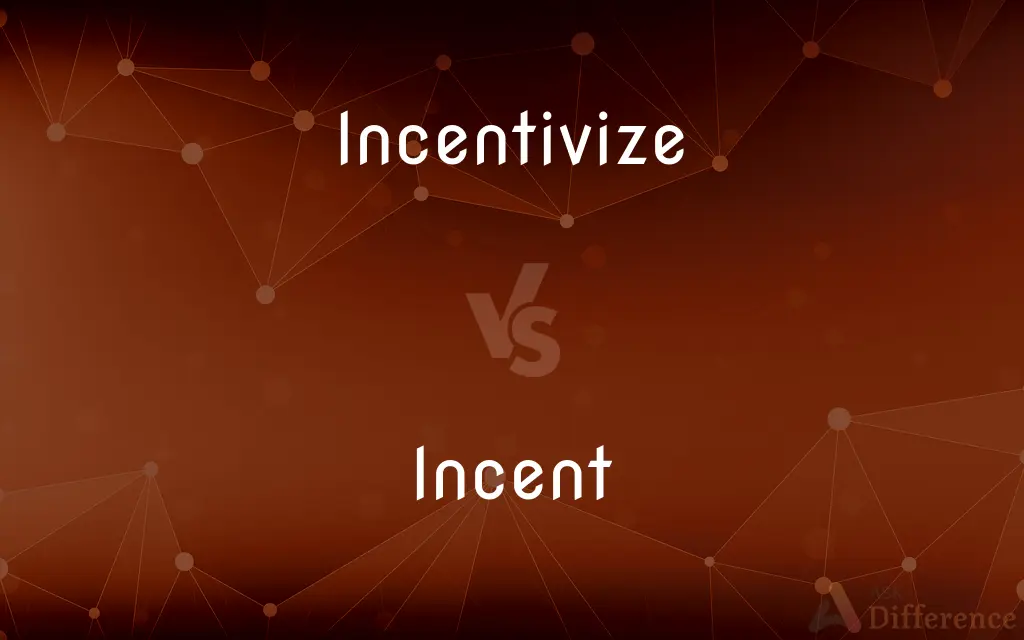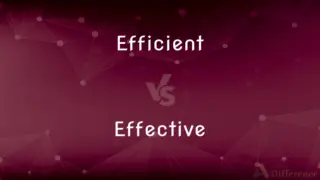Incentivize vs. Incent — What's the Difference?
By Tayyaba Rehman & Urooj Arif — Updated on March 18, 2024
Incentivize is the process of encouraging a specific behavior through incentives, while incent is a less common form that essentially means the same but is used more informally.

Difference Between Incentivize and Incent
Table of Contents
ADVERTISEMENT
Key Differences
Incentivize refers to the act of motivating or encouraging someone to take a particular action or pursue a certain behavior, often through rewards or incentives. This term is widely used in various contexts, such as business, education, and psychology, to describe strategies that involve offering benefits to induce desired actions. Incent, on the other hand, is a more concise version that carries the same meaning but is less frequently used in formal writing or speech. It implies providing an incentive or encouragement to do something, but its usage is often limited to more casual or informal contexts.
While "incentivize" is commonly accepted and understood in both professional and academic settings, "incent" might be considered colloquial or less precise. The choice between the two often depends on the tone and formality of the communication.
The effectiveness of both incentivizing and incenting actions depends on the nature of the incentives and the motivations of the individuals involved. Whether financial rewards, recognition, or other forms of incentives, the goal is to positively influence behavior.
Despite their slight differences in usage, the underlying principle of both terms is to encourage behavior through some form of reward or benefit, making them integral in strategies for change management, motivation, and behavioral economics.
Comparison Chart
Definition
To encourage or motivate through incentives.
To motivate or encourage, often used more informally.
ADVERTISEMENT
Usage
Common in formal and professional contexts.
More colloquial and less frequently used.
Context
Widely accepted in business, education, and psychology.
May be considered less formal or precise.
Purpose
To induce desired behaviors or actions through rewards.
Similar to incentivize, but with a more casual tone.
Effectiveness
Depends on the nature of the incentives and individual motivations.
Also relies on the appropriateness of incentives and personal motivations.
Compare with Definitions
Incentivize
Applied to promote healthy behaviors among patients.
The clinic incentivized regular check-ups by offering discounts.
Incent
Used in casual settings to encourage action.
They incented their friends to join the cleanup drive with a pizza party.
Incentivize
Employed to motivate employees towards achieving company goals.
The company incentivized meeting sales targets with bonuses.
Incent
Used within social circles to encourage involvement.
The club incented attendance at meetings with special guest speakers.
Incentivize
Used to encourage student participation and achievement.
The school incentivized reading by rewarding students with a book fair.
Incent
Applied in team settings to spur participation.
The project leader incented creative ideas with recognition awards.
Incentivize
Utilized to encourage eco-friendly practices.
The government incentivized recycling through tax rebates.
Incent
Common in startups to drive innovation.
The startup incented developers by offering stock options.
Incentivize
Designed to boost customer engagement and loyalty.
The app incentivized daily usage with points redeemable for rewards.
Incent
Employed in informal competitions to increase participation.
The community incented participation in the contest with local gift cards.
Incentivize
To offer incentives or an incentive to; motivate
"This bill will help incentivize everybody to solve that part of the problem" (Richard A. Gephardt).
Incent
Provide with an incentive
It makes sense for the government to incent people to invest in research and development
Incentivize
To provide incentives for; to encourage.
The US government seeks to incentivize home ownership through a favorable tax system.
Incent
To incentivize
"would use tax breaks to incent corporations to invest in their future" (Scott Canon).
Incentivize
To provide incentives to.
They effectively incentivized people to overinvest in home ownership.
Incent
To provide an incentive to (a person or organization).
We need to incent people to innovate more.
Incent
To provide an incentive for (something).
We need to incent more innovation.
Common Curiosities
Is it possible to over-incentivize, leading to negative outcomes?
Yes, over-incentivizing can lead to dependency, diminished intrinsic motivation, or unethical behavior.
Which is more appropriate for a business proposal, "incentivize" or "incent"?
"Incentivize" is more appropriate for formal documents like a business proposal.
Can non-monetary incentives be as effective as monetary ones?
Non-monetary incentives, such as recognition and personal growth opportunities, can be highly effective, especially for long-term motivation.
How do cultural differences affect the way people are incentivized?
Cultural values and norms significantly influence what types of incentives are effective, requiring tailored approaches in multicultural contexts.
What are some common mistakes in designing incentive programs?
Common mistakes include misaligning incentives with goals, offering too little or too much, and neglecting individual differences.
Is "incent" a real word?
Yes, "incent" is a real word, though less formal and less commonly used than "incentivize."
Can financial rewards always effectively incentivize behavior?
While financial rewards can be effective, their impact varies based on individual values and the context of the incentive.
How do incentives impact team dynamics?
Well-designed incentives can enhance teamwork and collaboration, but poorly designed ones may lead to competition or conflict.
What is the difference between intrinsic and extrinsic incentives?
Intrinsic incentives are internal, such as personal satisfaction, while extrinsic incentives are external rewards, like money or recognition.
How do you measure the effectiveness of an incentivization strategy?
Effectiveness can be measured through outcomes like improved performance, higher engagement levels, or achieving specific behavioral changes.
Can incentivizing be applied to personal goals?
Yes, personal incentivization strategies can be used to motivate oneself towards achieving personal goals, such as fitness or learning.
What role does psychology play in incentivizing behavior?
Psychological principles, such as reinforcement and motivation theories, are central to designing effective incentives.
How has the use of "incent" evolved over time?
"Incent" has gained some popularity in casual or business speech but remains less formal and less widespread than "incentivize."
Can the same incentive work universally across different industries?
While some incentives may have broad appeal, their effectiveness often varies by industry, company culture, and individual roles.
How important is feedback in the incentivization process?
Feedback is crucial, as it helps individuals understand how their actions align with the desired outcomes and reinforces the value of the incentives.
Share Your Discovery

Previous Comparison
Efficient vs. Effective
Next Comparison
Anteater vs. AardvarkAuthor Spotlight
Written by
Tayyaba RehmanTayyaba Rehman is a distinguished writer, currently serving as a primary contributor to askdifference.com. As a researcher in semantics and etymology, Tayyaba's passion for the complexity of languages and their distinctions has found a perfect home on the platform. Tayyaba delves into the intricacies of language, distinguishing between commonly confused words and phrases, thereby providing clarity for readers worldwide.
Co-written by
Urooj ArifUrooj is a skilled content writer at Ask Difference, known for her exceptional ability to simplify complex topics into engaging and informative content. With a passion for research and a flair for clear, concise writing, she consistently delivers articles that resonate with our diverse audience.














































